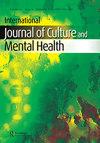Drivers of suicidal ideation among Greek military personnel
Q1 Social Sciences
International Journal of Culture and Mental Health
Pub Date : 2017-05-25
DOI:10.1080/17542863.2017.1325917
引用次数: 0
Abstract
ABSTRACT Background and Objectives: The aim of this study is to explore the effects of drug use, alcohol use, and psychiatric conditions on suicidal ideation among Greek military personnel. Design and Methods: A quantitative correlational survey design was applied, using data collected between January and September 2014 in the 414 Army Hospital in Athens. A number of officers and soldiers (n = 155) who were outpatients of the military psychiatric department completed a self-assessment questionnaire (CISQ-1 Triantafyllou, F., Giotakos, O., Tsouvelas, G., & Athanasiadou, A. (2014). CISQ-1: Primary findings from the questionnaire for the detection of critical psychopathological indicators in military personnel. E-poster presented at the World Federation for Mental Health Congress ‘Living with Schizophrenia’, Athens, Greece), which primarily focuses on the detection of critical psychopathological indicators and suicidal thoughts. An additional diagnosis was made by a psychiatrist. Results: A regression model revealed that participants who use drugs were more likely to exhibit suicidal thoughts. Moreover, those with affective disorders were more likely to exhibit suicidal ideation compared to persons with a negative diagnosis. The ones who drink occasionally were also more likely to display suicidal thoughts. Furthermore, in our predictive model affective disorder, personality disorder, and drug use associated with low wages were the strongest factors related to suicidal ideation. Conclusions: The Greek Armed Forces should undertake concentrated efforts in psychiatric and substances screening and develop suicide prevention programs with a focus on awareness and skill building.希腊军人自杀意念的驱动因素
背景与目的:本研究旨在探讨药物使用、酒精使用和精神状况对希腊军人自杀意念的影响。设计与方法:采用定量相关调查设计,使用2014年1月至9月在雅典414陆军医院收集的数据。在军队精神科门诊就诊的官兵(n = 155)完成了自评问卷(CISQ-1)。Triantafyllou, F., Giotakos, O., Tsouvelas, G., & Athanasiadou, A.(2014)。CISQ-1:军事人员关键精神病理指标检测问卷的初步调查结果。在世界精神卫生联合会大会(“精神分裂症患者”,雅典,希腊)上提交的电子海报,主要侧重于检测关键的精神病理指标和自杀念头。精神科医生又作了一次诊断。结果:回归模型显示,使用药物的参与者更有可能表现出自杀念头。此外,与诊断为阴性的人相比,情感障碍患者更有可能表现出自杀意念。偶尔饮酒的人也更有可能出现自杀念头。此外,在我们的预测模型中,情感障碍、人格障碍和与低工资相关的药物使用是与自杀意念相关的最强因素。结论:希腊武装部队应该集中精力进行精神病学和药物筛查,并制定自杀预防计划,重点是提高认识和技能建设。
本文章由计算机程序翻译,如有差异,请以英文原文为准。
求助全文
约1分钟内获得全文
求助全文
来源期刊

International Journal of Culture and Mental Health
Social Sciences-Cultural Studies
CiteScore
2.10
自引率
0.00%
发文量
0
期刊介绍:
This title has ceased (2018). This important peer-review journal provides an innovative forum, both international and multidisciplinary, for addressing cross-cultural issues and mental health. Culture as it comes to bear on mental health is a rapidly expanding area of inquiry and research within psychiatry and psychology, and other related fields such as social work, with important implications for practice in the global context. The journal is an essential resource for health care professionals working in the field of cross-cultural mental health.Readership includes psychiatrists, psychologists, medical anthropologists, medical sociologists, psychiatric nurses and social workers, general practitioners and other mental health professionals interested in the area. The International Journal of Culture and Mental Health publishes original empirical research, review papers and theoretical articles in the fields of cross-cultural psychiatry and psychology. Contributions from the fields of medical anthropology and medical sociology are particularly welcome. A continuing dialogue between members of various disciplines in various fields is encouraged. The aim of the journal is to encourage its readers to think about various issues which have clouded cross-cultural development of ideas. The journal lays special emphasis on developing further links between medical anthropology, medical sociology, clinical psychiatry and psychology, and implications of the findings on service provisions. The journal is published four times a year. The style of reference is Harvard. All research articles in this journal, including those in special issues, special sections or supplements, have undergone rigorous peer review, based on initial editor screening and anonymized refereeing by at least two independent referees.
 求助内容:
求助内容: 应助结果提醒方式:
应助结果提醒方式:


